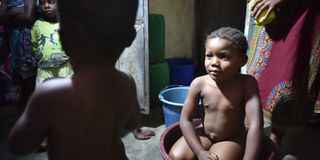Healthy Briton to be injected as trial begins for an Ebola vaccine

A woman is about to wash her child with salty water on August 25, 2014 in a suburb of Abidjan, relying on a rumour claiming that salty water helps fight the Ebola virus. AFP PHOTO | ISSOUF SANOGO |
What you need to know:
- Developed jointly by British company GlaxoSmithKline and the US National Institutes of Health, the vaccine has produced good results in testing on monkeys.
- The UN health agency said a total of 5,357 people had been infected across five west African countries, and that 2,630 had died.
- In Liberia, which has been hit hardest by the outbreak, 1,459 people had died from Ebola, representing 54 percent of the 2,720 people infected.
A healthy British volunteer became the first person to receive a new vaccine for the Ebola virus in a trial at the University of Oxford Thursday.
The testing began as Britain announced it would increase aid to Sierra Leone to provide 700 treatment beds over the coming months, with military personnel helping their roll out.
The volunteer is one of 60 who will receive the drug at the University of Oxford in testing that will run alongside similar trials in the United States and could mean a vaccine being produced by the end of the year.
Researchers hope to establish whether the vaccine, which contains genetic material from the Ebola virus, can trigger the immune system to produce enough antibodies to fight off the disease, which has a mortality rate of over 50 per cent.
The vaccine specifically targets the Zaire species of Ebola.
“The tragic events unfolding in Africa demand an urgent response,” professor Adrian Hill, who heads up the research team in Oxford, said last month when the trial was announced. “We, and all our partners on this project, are optimistic that this candidate vaccine may prove useful against Ebola.”
Developed jointly by British company GlaxoSmithKline and the US National Institutes of Health, the vaccine has produced good results in testing on monkeys.
The Jenner Institute in Oxford has been given £2.8 million (Ksh400 million) for the testing, which should allow GlaxoSmithKline to produce an additional 10,000 doses of the vaccine during the trial period. The WHO has said the vaccine could be available from November if it proves safe, although researchers are more cautious and say it would be by the end of the year.
On Wednesday, Britain said that military personnel would help to identify sites for 700 treatment beds, as well as providing and training staff to operate the beds.
“The Ebola epidemic in west Africa is already an unprecedented humanitarian emergency for the affected countries,” said Foreign Secretary Philip Hammond.
“If we fail to act now it could become a global catastrophe with disastrous consequences.”
Meanwhile, Sierra Leone prepared today for an unprecedented three-day nationwide lockdown to contain the deadly spread of the Ebola virus in a controversial move which experts claimed could worsen the epidemic.
The population of six million will be confined to their homes from midnight going into Friday as almost 30,000 volunteers go door-to-door uncovering patients and bodies hidden in people’s homes.
“Rain or shine, the shutdown exercise is going to go ahead. During the three days... the job is going to get done,” said Steven Gaojia, head of the government’s emergency operation centre.
Meanwhile, Ebola has now infected more than 5,000 people in west Africa and killed around half of them, the World Health Organization said Thursday.
The UN health agency said a total of 5,357 people had been infected across five west African countries, and that 2,630 had died.
In the three hardest-hit countries of Guinea, Libera and Sierra Leone, 45 percent of the cases were recorded in the past three weeks, WHO said.
In Guinea, where the outbreak began at the start of the year, Ebola had claimed 601 lives, or 64 percent of the 942 people infected.
Thirty-three per cent of those cases surfaced in the 21 days leading up to September 14.
In Liberia, which has been hit hardest by the outbreak, 1,459 people had died from Ebola, representing 54 percent of the 2,720 people infected.
A full 52 per cent, or 1,383, of those cases were recorded during the three weeks before September 14.
In Sierra Leone, 562 people had died from Ebola, accounting for 34 per cent of the 1,673 people infected.
Thirty-nine per cent of those cases were recorded during the preceding 21 days.





